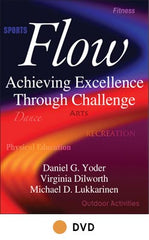Concentration
It has been suggested that intense concentration may be the defining characteristic of flow experiences (Hu & Kuh, 2002). Intense and focused attention is absolutely crucial to the experience of flow; however, because all of the characteristics are intertwined, it may be misleading to indicate that one is more important than another. As the following discussion of concentration and distraction illustrates, all flow elements are entwined.
The ability to concentrate is necessary for raising your skill level, thus allowing you to meet the challenge posed by an activity. Performing any activity better requires a great deal of mental effort. While you can grasp the concept of pushing yourself physically, it may be more difficult to fully comprehend the idea that to achieve an optimal experience you must do the same on an intellectual level. You are dealing with intellectual novelty (pushing the mental envelope), and you must reach a dynamic balance between intense and focused attention and the willingness to allow a degree of divergent thought. Simply being open to fleeting new thoughts and urges is only half of the phenomenon. This unfocused brainstorming—jumping from one idea to another—accomplishes very little in the pursuit of optimal experiences. It is only when you discipline your mind with intense concentration that you are in a position to experience flow. When rock climbers, jazz musicians, or researchers are zoned in, they mentally analyze and test behaviors before physically trying them. Of course, in most optimal experiences, this takes only a fraction of a second and is performed at an extraordinary level that may be below consciousness.
Without intense concentration the crucial feedback loop becomes impossible. The mental and physical trials do not get communicated rapidly or thoroughly enough to facilitate the enhanced performance you are seeking. You might have to repeat some of the earlier steps. This slows down the process and impedes the process of flow.




